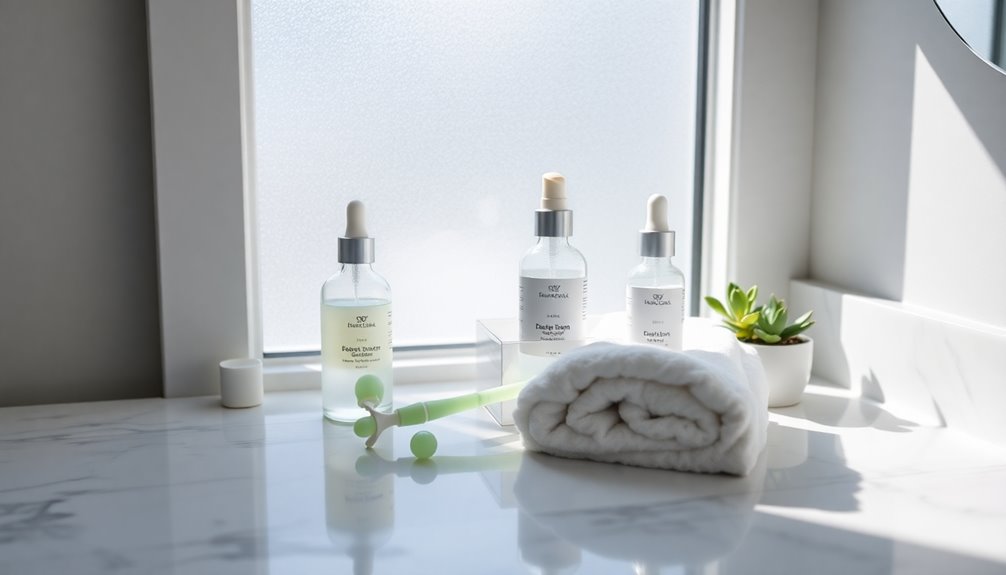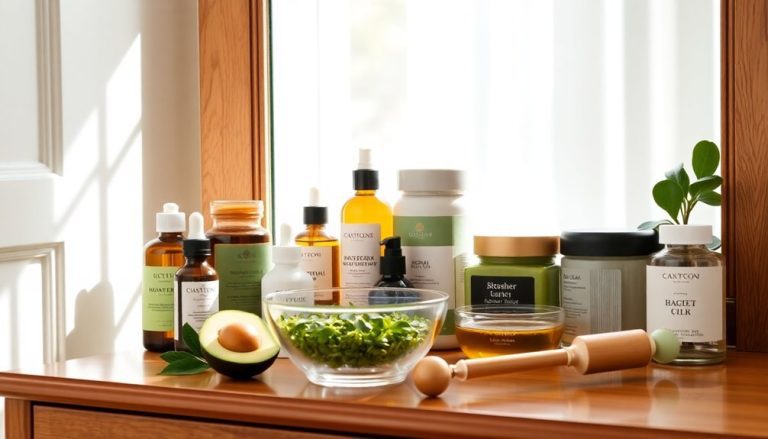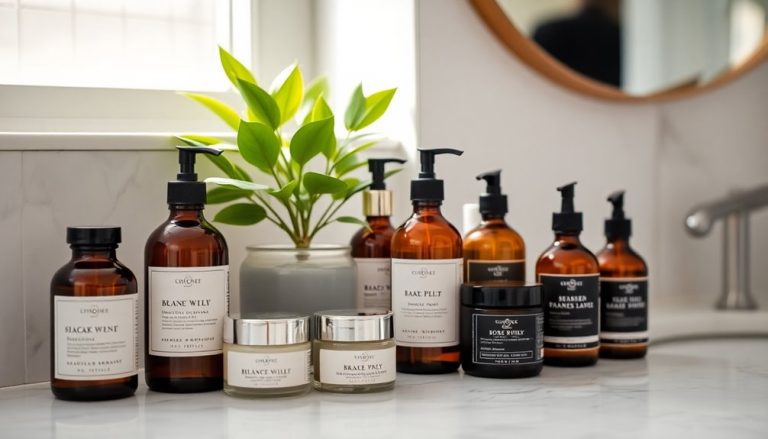If you've got sensitive skin, your anti-aging routine should focus on gentle, hydrating products. Start your morning with a sulfate-free cleanser, followed by a hydrating toner infused with soothing ingredients like chamomile. Use a lightweight vitamin C serum to protect your skin, and finish with a fragrance-free moisturizer and broad-spectrum SPF 30 sunscreen. In the evening, cleanse again, apply a nourishing serum with antioxidants, and seal in moisture with a lightweight night cream. Always avoid irritants like synthetic fragrances and alcohols. Stick around to discover more tips tailored specifically for your sensitive complexion!
Key Takeaways
- Start with a gentle, sulfate-free cleanser to avoid stripping moisture and irritation.
- Incorporate a lightweight antioxidant serum, such as vitamin C, to promote collagen production and protect against oxidative stress.
- Use a calming moisturizer with soothing ingredients like aloe vera or chamomile to maintain hydration and support the skin barrier.
- Apply broad-spectrum SPF 30 or higher sunscreen daily to protect sensitive skin from UV damage and prevent premature aging.
- Monitor your skin's reaction to new products and adjust your routine to maintain comfort and minimize irritation.
Understanding Sensitive Skin
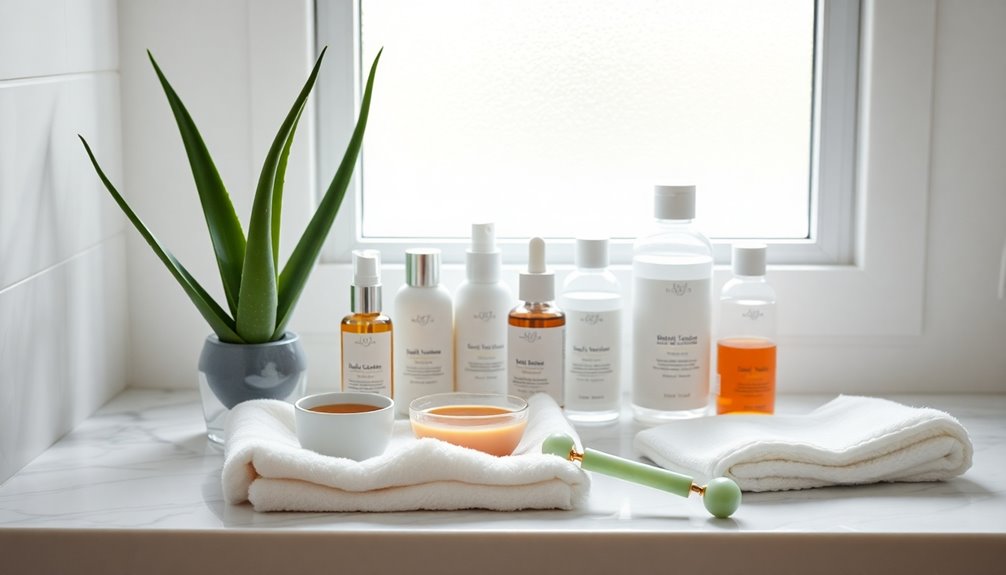
Understanding Sensitive Skin
Sensitive skin affects a significant number of people, making it essential to understand its unique characteristics. If you have sensitive skin, you might find that it reacts easily to environmental factors, products, or even stress. It often feels tight, itchy, or inflamed, and redness can appear after using certain skincare items. Knowing your skin type helps you tailor your routine effectively.
You might also notice that your skin barrier isn't as strong as it should be. This means that irritants can penetrate more easily, leading to discomfort. Choosing the right products is vital; you should aim for gentle formulations that don't contain harsh chemicals or fragrances. Incorporating eye lift serum into your routine can provide additional support for maintaining a youthful appearance.
Additionally, watch for triggers in your environment, like extreme temperatures or pollution. They can exacerbate sensitivity. Keeping a journal of skincare products and environmental factors can help you identify what works and what doesn't. Incorporating anti-redness creams into your routine may also assist in calming irritated skin.
Finally, remember that sensitive skin can age just like any other skin type. Therefore, you'll need to incorporate anti-aging strategies that respect your skin's fragility while still delivering the benefits you seek. Understanding your skin's needs is the first step in creating an effective anti-aging routine.
Key Ingredients to Look For
When selecting products for your anti-aging routine, focus on ingredients that nourish and strengthen your skin without causing irritation.
Look for gentle hydrators like hyaluronic acid, which attracts moisture and plumps your skin, reducing the appearance of fine lines. Niacinamide is another powerhouse; it boosts your skin's barrier function, evens out skin tone, and can help soothe redness.
Antioxidants like vitamin C are essential too. They protect your skin from environmental damage while promoting collagen production, which is crucial for maintaining firmness. Incorporating Vitamin C serums into your routine can significantly enhance your skin's radiance and texture. Additionally, using a skin whitening cream can complement your routine by improving overall skin tone and brightness.
You might also want to explore peptides, which support skin repair and improve elasticity, making your skin look more youthful.
You can also consider incorporating botanical extracts such as chamomile or calendula. These can calm inflammation and provide a soothing effect.
Finally, don't underestimate the power of gentle exfoliants like lactic acid, which can help slough off dead skin without being too harsh.
Ingredients to Avoid
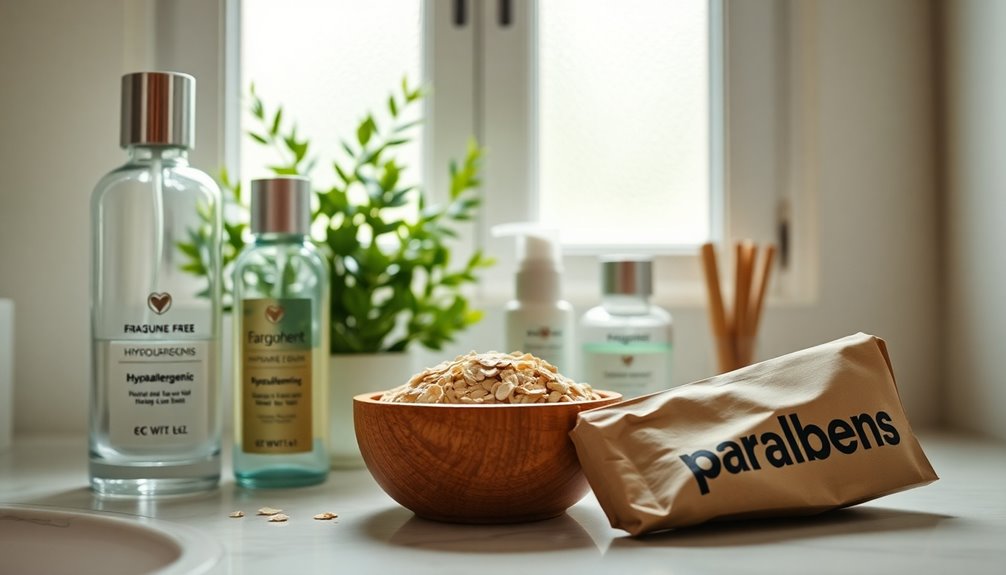
Even with the right nourishing ingredients, it's just as important to steer clear of certain components that can irritate sensitive skin. First on the list are alcohols, particularly denatured alcohol and isopropyl alcohol, which can strip your skin of moisture and cause dryness or redness.
Next, watch out for synthetic fragrances. These can trigger allergic reactions or sensitivities, so opt for fragrance-free products instead.
Similarly, avoid harsh exfoliants like physical scrubs or strong chemical exfoliants, such as glycolic acid or salicylic acid, which can lead to irritation and inflammation.
You should also be cautious with essential oils. While they may seem natural, many can cause reactions, especially in sensitive skin.
Ingredients like sulfates and parabens are another no-go; they can lead to irritation and disrupt your skin's natural barrier.
Lastly, steer clear of products with high concentrations of retinoids or vitamin C. These potent ingredients can be too aggressive for delicate skin types. Additionally, choosing products that feature nourishing ingredients can help maintain skin balance and prevent irritation.
Morning Routine Essentials
A well-structured morning routine is key to maintaining healthy, youthful skin, especially for those with sensitivity.
Start your day with a gentle cleanser that removes impurities without stripping your skin's natural oils. Look for sulfate-free formulas that are fragrance-free to minimize irritation.
Next, apply a hydrating toner. Opt for one that contains soothing ingredients like chamomile or aloe vera. This helps to prep your skin for the following steps while calming any redness.
After toning, incorporate a lightweight serum infused with antioxidants. Vitamin C is an excellent choice, as it brightens your complexion and protects against environmental stressors. Be sure to choose a formulation that's free from alcohol and irritants.
Following the serum, use a moisturizer tailored for sensitive skin. It should provide hydration without clogging your pores. Look for products labeled as non-comedogenic and hypoallergenic.
Finally, don't skip sunscreen. A broad-spectrum SPF 30 or higher is essential, even on cloudy days. Choose a mineral sunscreen with zinc oxide or titanium dioxide, as these tend to be gentler on sensitive skin.
Evening Routine Must-Haves
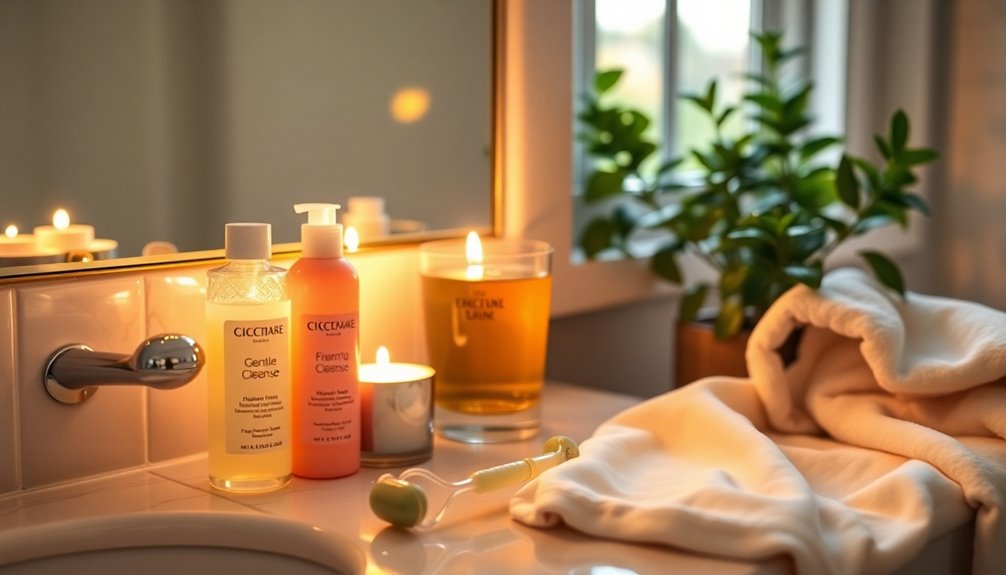
After a long day, your evening routine is the perfect opportunity to rejuvenate and repair your sensitive skin.
Start by gently cleansing your face with a mild, sulfate-free cleanser to remove impurities without stripping your skin's natural oils. Look for formulations that include soothing ingredients like chamomile or aloe vera.
Next, consider using a gentle exfoliant two to three times a week. Opt for a chemical exfoliant with lactic or glycolic acid, which can help slough away dead skin cells without causing irritation.
Once your skin is clean and prepped, it's time to apply a nourishing serum. Choose one packed with antioxidants like vitamin C or E to combat free radicals and promote skin regeneration.
Finally, seal in all the benefits with a lightweight, fragrance-free night cream designed for sensitive skin. This will help support your skin's barrier while you sleep.
Remember to pay attention to your skin's response to new products. If irritation occurs, adjust your routine accordingly.
Consistency is key, but listening to your skin's needs is crucial for maintaining its health and vibrancy.
Hydration and Moisturization Tips
Proper hydration and moisturization are essential for keeping sensitive skin looking youthful and healthy. Start by choosing a gentle, alcohol-free hydrating toner or essence after cleansing. This step helps to prep your skin for better absorption of subsequent products.
Look for ingredients like hyaluronic acid, which attracts moisture, and aloe vera, known for its soothing properties.
Next, apply a lightweight moisturizer that suits your skin type. If you have oily skin, opt for a gel-based formula, while a cream-based moisturizer works well for dry skin.
Ensure that your moisturizer contains nourishing ingredients like ceramides and glycerin to help lock in hydration.
Consider incorporating a hydrating serum into your routine. Serums with antioxidants can provide an extra boost, helping to repair and protect your skin.
Apply it before your moisturizer for best results.
Finally, don't forget to hydrate from the inside out. Drink plenty of water throughout the day, and consider adding foods rich in omega-3 fatty acids, like salmon or walnuts, to your diet.
This holistic approach will help maintain your skin's moisture barrier and keep it looking plump and radiant.
Sun Protection Strategies
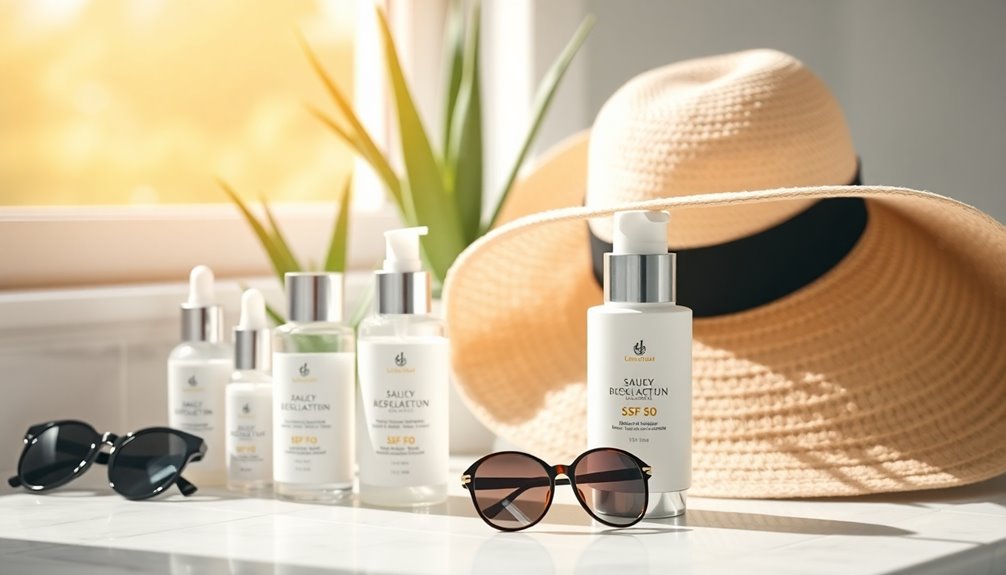
Sun protection is crucial for maintaining youthful skin, especially for those with sensitive complexions. You need to choose the right sunscreen to shield your skin from harmful UV rays without causing irritation. Look for broad-spectrum sunscreens with at least SPF 30, and opt for mineral-based formulas containing zinc oxide or titanium dioxide. These ingredients sit on top of your skin, reflecting UV light rather than absorbing it, making them gentler for sensitive skin.
When applying sunscreen, don't forget areas like your ears, neck, and the back of your hands, which are often overlooked yet prone to sun damage. Aim to apply sunscreen 15 minutes before going outside, and reapply every two hours, especially after swimming or sweating.
In addition to sunscreen, consider wearing protective clothing, such as wide-brimmed hats and long sleeves, to further shield your skin. Seek shade whenever possible, particularly during peak sun hours between 10 a.m. and 4 p.m.
Additional Care Techniques
In addition to sun protection, your sensitive skin benefits from a tailored care routine that addresses its unique needs.
Incorporating the right techniques can help soothe irritation and improve your skin's overall appearance. Here are some additional care techniques you should consider:
- Choose Gentle Cleansers: Opt for sulfate-free, hydrating cleansers to remove impurities without stripping your skin's natural moisture.
- Moisturize Regularly: Look for fragrance-free moisturizers with calming ingredients like aloe vera or chamomile to hydrate and protect your skin barrier.
- Incorporate Antioxidants: Use serums with vitamin C or E to combat oxidative stress and promote a youthful glow without causing irritation.
- Patch Test New Products: Always test new products on a small area first to ensure they don't provoke a reaction.
- Stay Hydrated: Drink plenty of water and eat a balanced diet rich in vitamins and minerals to support skin health from the inside out.
Frequently Asked Questions
Can I Use Anti-Aging Products While Pregnant?
You can use some anti-aging products while pregnant, but it's crucial to check ingredients. Avoid retinoids and certain acids. Always consult your healthcare provider for personalized advice to ensure safety for you and your baby.
How Can I Test Products for Sensitivity?
To test products for sensitivity, apply a small amount on your wrist or behind your ear. Wait 24 hours to see if any irritation occurs. If there's redness or itching, avoid using the product.
Are There Specific Brands Recommended for Sensitive Skin?
Yes, several brands cater to sensitive skin. Look for products from Cetaphil, La Roche-Posay, and Avene. They offer gentle formulations that minimize irritation while still providing effective anti-aging benefits. Always patch-test before full use.
How Long Until I See Results From My Routine?
You might not see immediate results from your routine; factors like skin type and product efficiency play a role. Generally, you should notice improvements in about four to six weeks if you stay consistent.
Can Diet Affect My Skin's Aging Process?
Yes, your diet can significantly affect your skin's aging process. Eating antioxidant-rich foods, staying hydrated, and avoiding processed sugars helps maintain elasticity and radiance, reducing visible signs of aging over time. Prioritize whole, nutrient-dense meals.
Conclusion
In the garden of your skin, nurturing sensitive petals requires gentle hands and wise choices. By selecting the right ingredients and avoiding harsh thorns, you cultivate a vibrant bloom that withstands the test of time. Embrace hydration like the morning dew, shield your blossoms from the sun's fierce rays, and tend to your nightly rituals like a careful gardener. With patience and care, your skin will flourish, revealing the beauty that lies within, untouched by the passing seasons.

